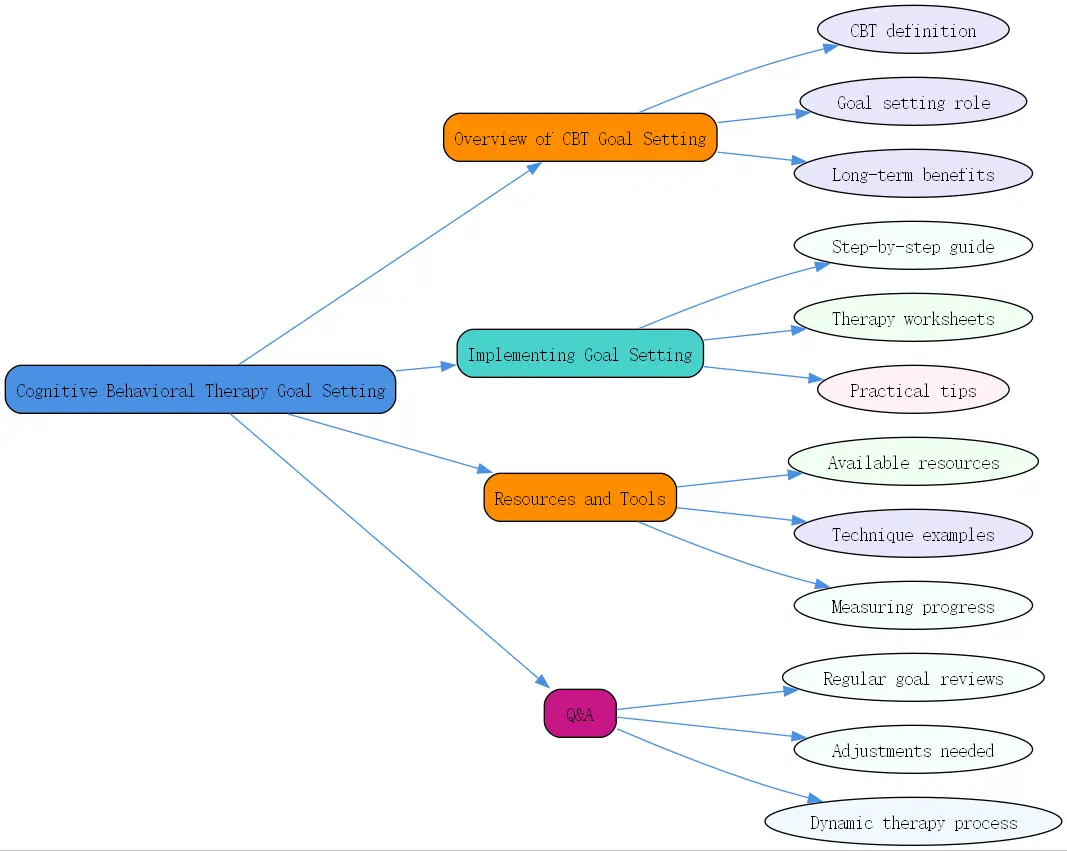Discover the transformative power of goal setting in cognitive behavioral therapy (CBT). Learn how this structured approach can significantly enhance your mental well-being and motivation.
Cognitive Behavioral Therapy Goal Setting: An Overview

What is Cognitive Behavioral Therapy (CBT)?
Cognitive Behavioral Therapy (CBT) is a robust psychological treatment that helps individuals manage their problems by changing the way they think and behave. Unlike other therapeutic approaches which often focus on digging into one’s past, CBT is more present-focused and solution-oriented. It equips individuals with practical skills to alter dysfunctional thinking and behavior.
The Role of Goal Setting in Cognitive Behavioral Therapy
In CBT, goal setting is not just an accessory; it’s a core element. Setting clear, achievable goals is pivotal as it provides a roadmap for therapy, giving both the therapist and the client a clear path to follow. It assists in the identification of specific, measurable, and realistic targets, which is crucial in managing conditions like depression and anxiety.
Long-Term Benefits of Goal Setting in CBT
Goal setting in CBT fosters long-term benefits like sustained mental health improvements and heightened motivation. By setting and achieving goals, individuals can see tangible progress in their therapeutic journey, which bolsters their confidence and encourages them to engage further in the therapeutic process.
Implementing Goal Setting in Cognitive Behavioral Therapy
Step-by-Step Guide to Goal Setting in CBT
Context and Relevance to Current Thoughts and Behaviors
To effectively set goals in CBT, understanding the context and how these goals relate to one’s current thoughts and behaviors is crucial. This relevance gives the goals more weight and increases commitment to achieving them.
Self-reflection
Self-reflection is a vital aspect of CBT goal setting. It involves introspection on behaviors, patterns, and the emotions that drive them. This helps in setting meaningful and personalized goals.
Review and Analysis
After setting goals and working towards them, it’s important to review and analyze what was achieved. This step helps in understanding what works and what needs adjustment.

Application and Follow-up
Applying the insights gained from the analysis is crucial. Regular follow-ups ensure that the goals are still relevant and adjustments are made to align with any new developments in the individual’s therapy process.
Using Therapy Worksheets for CBT Goal Setting
Therapy worksheets are invaluable tools in CBT for goal setting. They aid in structuring thoughts and tracking progress. Worksheets foster engagement with the therapeutic process, making self-reflection and subsequent discussions more productive. For practical application, consider managing social anxiety, a cognitive behavioral therapy approach client workbook which provides structured assistance.
Goal Setting Cognitive Behavioral Therapy: Practical Tips
Breaking large goals into smaller, achievable steps is essential in maintaining motivation and avoiding overwhelm. Recognizing and planning for potential obstacles also prepares individuals to handle challenges effectively.

Resources and Tools for Goal Setting in Cognitive Behavioral Therapy
Goal Setting Tool for Cognitive Behavioral Therapy: Available Resources
There are numerous resources available that can aid in goal setting in CBT. From online platforms offering free therapy worksheets to comprehensive client workbooks like this one, the options are extensive and useful.
Examples of Goal Setting Cognitive Behavioral Therapy Techniques
The SMART goals framework is particularly effective in CBT. It ensures that goals are Specific, Measurable, Achievable, Relevant, and Time-bound. Cognitive restructuring, a core part of CBT, also plays a significant role in how individuals set and perceive their goals, influencing overall success.
Cognitive Behavioral Therapy and Goal Setting: Measuring Progress and Maintaining Motivation
It’s crucial to keep track of progress and celebrate small victories in the journey of CBT. Adjusting goals as needed and finding ways to stay motivated, even through setbacks, are essential strategies for sustained success.
Q&A Section
Question: How often should goals be reviewed and adjusted in the context of Cognitive Behavioral Therapy?
Answer: Goals should ideally be reviewed in regular intervals, typically every few therapy sessions. This allows for timely adjustments based on the client’s progress or any new challenges that have emerged. Regular review helps keep the therapy process dynamic and responsive to the client’s evolving needs.



